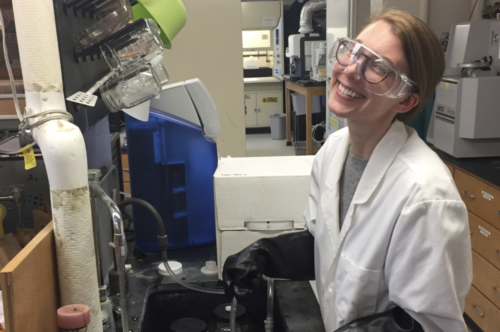38 new faculty and staff members joined the Fieldston community this school year. One of them is Abigale Koppa. She teaches the Science Research program, the science portion of City Semester and some electives in the Spring that include Animal Behavior and Anatomy in Physiology. Dr. Koppa studied at Stony Brook University for seven years and received a PhD in Ecology and Evolution there. Before coming to Fieldston, she taught at one of the eight specialized high schools in New York City, the Brooklyn Latin School, for five years.
Growing up, she stressed about choosing between STEM and humanities. Not fitting into the norms of a typical science student and being inclined towards history put her under much pressure. It wasn’t until Dr. Koppa’s senior year AP Biology class in high school that she discovered science held a special place in her heart. She enjoyed taking on the challenges that the course gave her and felt invigorated learning complicated subjects. Dr. Koppa shared, “I tried to establish that as a philosophy for my life in general: When you are doing something, if it is challenging but it feels good, that’s the path you want to go down.”
In graduate school, Dr. Koppa was particularly interested in human evolution. The young scientist conducted research in Kenya and South Africa to understand the diets of ancient human relatives from one to two million years ago. “Diet is such a powerful tool to view evolution because it influences your behavior, the way you use your landscape and interactions you have with your environment.”
Koppa was first introduced to teaching science while she was in graduate school. She taught undergraduate lab courses at Stony Brook University. “I enjoyed the breath of fresh air that I got from teaching,” said Dr. Koppa. “I didn’t necessarily know a lot about the course I was assigned to at the start, so it gave me the opportunity to learn about different things and expand my base of knowledge.” Compared with working diligently and purposefully on one subject for a long time and often being away from family, “teaching was much more supportive in living the life I wanted to live while staying in the science field.”
A main reason why Dr. Koppa became a science teacher at Fieldston was because of her excitement about the school’s science research program. Such programs are uncommon in high school. She’s excited to be able to teach the course because it “offers students who might be science-minded to get a taste of what it’s like to be a scientist very early in their academic career.” The program primarily focuses on lab work. Students learn how to formulate research questions and perform various lab techniques such as DNA extraction, DNA amplification, gel electrophoresis, DNA sequencing and much more. Exposure to such a professional setting early on is a valuable and beneficial experience. “Joy can be found in this program,” said Dr. Koppa. The freedom for students to self-direct their learning, to go out and collect data then finally present their findings is a huge responsibility, but an exciting one at that.
Outside the classroom and the lab, Dr. Koppa has many hobbies. She loves to cook, read, spend time with her daughter and watch the New York City Ballet perform at the Lincoln Center. In the classroom, she finds joy in being a teacher and feels fulfilled by helping her students learn new things. Science research can be difficult, but Dr. Koppa is excited to assist the rising scientists in the Fieldston community.






